- Home
- Jane Arbor
A Growing Moon Page 2
A Growing Moon Read online
Page 2
‘And besides,’ put in Lesley, ‘we calculated tha t not knowing couldn’t hurt Aunt Ursula too much. I don’t suppose, being so rich, that she’s ever made up a bed herself since she married, and she can’t be so near the breadline that she would have to send out for a couple of extra hamburgers for our supper. Well, can she?’ Lesley appealed in her turn.
Exasperated by what they saw as simple logic, Dinah practically ground her teeth at them. ‘I could cheerfully beat you both,’ she told them. ‘You don’1 deserve to be welcomed at an allotment hut, let alone a palace on Venice’s Grand Canal. Besides, who’s going to take the blame for apparently going along with it with you ? Old Muggins, that’s who. In other words—me! Come on then. Let’s go.’ Subdued, they followed her to the line of moto-scafi, where the boatman, with whom she bargained in his own language, nodded his knowledge of the Palazzo d’Orio and helped them all into his boat.
The time was evidently the evening rush-hour. The quays were alive with strolling tourists and hurrying workers; the water of the canal heaved and churned under the onslaught of dozens of motorboats, the occasional barge and the fussy water-buses, crowded to their handrails, which chugged up and down and across from one landing-station to the next. Most of the bordering buildings came sheer down to the water; their proprietor’s private craft moored between drunken mooring-posts; their lower frontages still scarred by the marks of the high-water level of the tragic flood-tides of a few years earlier. By the time their boat turned into the wider stretches of the Grand Canal the twins’ faces had begun to show their disillusionment with their surroundings.
‘It’s all a bit tatty, isn’t it?’ remarked Jason, eyeing blackened timbers and peeling shutters and rusty mooring-chains. ‘D’you suppose any of it ever gets a coat of paint?’
Lesley said, ‘There’s supposed to be a Lido. I ex pected beaches
and super hotels. Where are they?’ Dinah, who at least knew her Venice in theory, said, ‘Not here. This is the city of Venice; the Lido is an island, a water journey away.’ Privately she too was a little disappointed in the Venice they were seeing and hearing at canal-level, but lifting her eyes up and away to the great sweep of the buildings along the curve of the Canal, every roofline a cut-out pattern against the vivid evening sky, she realised she was looking at the Venice Canaletto had painted, and she was enchanted; grateful too that her job should have brought her here to work.
After about ten minutes’ run the boatman crossed the water against the main traffic stream and edged skillfully in alongside a moored cabin-cruiser, all shining chromium and paintwork in contrast to the worn and patchy apricot-coloured brickwork against which it gently bobbed. There were a few steps up to the narrow quay; the man took them at a bound, announced, ‘Il Palazzo d’Orio,’ helped his passengers out, hauled out their luggage, accepted his fare and swept away in the boat he hadn’t troubled to moor.
The narrow building rose sheer, its flat facade broken only by scrolled-iron balconies at second and third-floor shuttered windows. The expanse of brick and the closed shutters gave it a blind look; on one side it was attached to its neighbour, on the other a narrow water-channel ran back to a connecting wall. Jason, indicating the channel, said, ‘The tradesmen’s entrance, d’you suppose? What a dump! This can’t be it, can it? Just look at the front door—it can't have been opened in welcome for years!’
The door in question, magnificently carved and flanked by two tall standard lanterns, was certainly a formidable barrier. But as no more modest entrance offered, Dinah used the kind of bell-pull which deserved an embroidered tassel, and was encouraged to hear it connect electrically within.
They waited, but not for long. The great door, which should have creaked and groaned, opened smoothly; the lanterns, springing to life, threw a faint path of light across the water before them, and behind the small crone in black who had opened the door, there was a glimpse of a marble-paved hall and some elegant furnishings.
The little old lady shook her head in answer to Dinah’s inquiry for the Signora Vidal. ‘The Signora is not here,’ she said.
‘She is out?’
‘She is not here.’ An expressive hand was waved outwards. ‘She is away from home. W ho wants her?’
Even the twins’ lack of Italian got the message of that. Dinah heard them gasp. She said, ‘The Signora’s niece and nephew from England.’
‘ 'You, signorina ? ’
‘No. I am just a friend.’ Dinah thrust the twins forward. ‘These two.’
‘Ah, the Signora expects them? Knows that they come?’
‘Well.......’ When Dinah hesitated, the crone
nodded.
‘Wait,’ she said. ‘Come in and wait. I shall fetch the Signore. He will know.’
The three stood in the hall, their baggage an untidy mound at their feet. When Lesley s aid, ‘I suppose it was silly, our not posting that letter in time,’ Dinah couldn’t resist a sharp, ‘Exactly. Now see where you’ve landed yourselves!’ and Jason mused, ‘The Signore. That’ll be Aunt Ursula’s son, our cousin Cesare. Well, thank goodness for him at least. Because if he has any cousinly feelings at all, he can’t very well throw us out on the street.’
‘If there were a street,’ Lesley giggled nervously as a door down the hall was opened and a tall figure, escorted by the old lady as by a fussy tug, came down towards their group after dismissing her with a ‘All right, Tomasa. I’ll deal with it,’ upon which she scuttled away.
Recognition was instant. The young man’s glance, not hidden behind spectacles now, was not wall-eyed but dark, direct and critically questioning, summing up his visitors’ nuisance value in much the same degree as his manner had seemed to measure it only as recently as yesterday afternoon.
‘Well, well—fate working overtime to ensure that we should meet,’ he remarked. ‘But you gave me to understand that Domodossola was your objective, I thought?’
‘Only for last night. We came on to Venice this morning, as we had planned,’ Dinah told him.
‘All the way from England in that carrycot of a car, and without troubling to announce yourselves until you arrived?’
‘Not really. A letter was sent, but it must have been delayed,’ Dinah lied gallantly for the twins’ sake. ‘You see. I’m afraid neither Jason nor Lesley en visaged that their aunt might not be here.’
‘She is on holiday in America. She always leaves Venice to the tourists in August. I am Cesare, as you’ll have guessed. You are Lesley?’ He offered a hand. ‘And Jason? And you are ?’ he asked of Dinah.
‘We’re neighbours at home. My family and the Herberts are friends. I’m Dinah Fleming,’ s he said.
‘Coming along for the ride, or in the role of chaperon?’
‘Because Jason and Lesley asked me. Because their people didn’t care for their coming alone, and because I was coming to Venice shortly in any case, to take up a job.’
‘And meanwhile—your p lans and theirs?’
Dinah looked at the twins, feeling it was time they laid their claim to a less chilly welcome than this. She herself hadn’t anything to expect from the man, but the other two were his cousins, after all!
Evidently Jason read the hint in her glance. He
said, ‘Well, we hoped............That is, we thought..............
I mean, we expected Aunt Ursula to be here and that she would be glad to see us. It’s an awfully long time since she last came to
England, and we’ve never even seen you. And we did write, inviting ourselves—
really! It’s just that ----------- ’
‘—Your letter went astray,’ Cesare finished for him smoothly. He shrugged. ‘Well, never let it be said we Venetians are wanting in hospitality. A moment.’
He went back down the hall and called Tomasa out from whatever dark recesses she had disappeared into. They talked in Italian. Dinah heard him order, ‘Have the girls get the three third -floor rooms ready, and call in Giuseppe to take up the luggage. And they’ll ne
ed dinner, I daresay. You’ll see to that. No, not for me.’ He turned back to the others. ‘If you will go with Tomasa, I’ll have your stuff sent up.’
Jason registered relief and muttered ‘Thank you,’ and Lesley echoed him. They waited for Dinah to go ahead of them. But she stayed where she was and they went with Tomasa without her.
She faced the surprise implicit in Cesare’s raised eyebrows. ‘Not for me, please,’ she said. ‘It’s kind of you, but I’m not staying. I only came to see Jason and Lesley safe, and I’ve a hotel room booked in the city.’
‘Where? At what hotel?’
‘The Cavour.’
‘I’ve never heard of it. It must be one of the tourist places.’
‘It is. It’s one of those at which we book in our clients.’
‘“Your” clients?’
‘My firm’s clients. I work for Plenair, a travel agency, and I’ve come to join the Venice branc h.’ ‘As?’
Dinah gave a small shrug. ‘Maid of all work— clerk, courier, interpreter. ’
‘And you’ll be living at this Cavour place?’
‘Only temporarily, until I take over the apartment of the girl who will be going to the London branch in my place. But that wo n’t be
for a week or two yet.’ ‘So you are not committed permanently to
the hotel, and can ring to cancel your booking, can’t you?’
She stared, frowning. ‘But I don’t want to. I’ve told you, I’m not staying. You don’t have to put me up as well as your cousins! ’
‘And I’m telling you that, if you aren’t willing to stay, after tonight they aren’t staying either. Well?’ ‘But that’s absurd,’ Dinah protested. ‘You can’t turn them out. They came expecting a welcome from your mother, and their people will expect to hear of them in your care if they can’t be in hers.’
‘I could tell them, “Nice to have met you,” and pack them safely back home.’
She could almost have stamped her foot at the airiness of the man’s tone. ‘You wouldn’t dare!’ she defied him. ‘They’re spe nding all their own money on this trip, and they are not being sent home.’ ‘Then I’ll park them out with a dowager of my acquaintance. I know just the one who would take them for a fee. But be responsible for them here, I will not.’
‘Why not?’
‘Because I am a busy man; such leisure as I am able to earn I spend as I please, and I’ve no intention of playing sole guide and social entertainer to a couple of naive teenagers who’ve been wished on me unbidden. Do I make myself clear?’
Dinah nodded. ‘Perfectly. C lear too that you also make yourself sound incredibly selfish, and rather as if you spend any leisure you get in one long debauch for which you don’t want witnesses!’
She expected a searingly sharp retort to the rudeness of that, and was a little taken ab ack when it did not come. He said coolly, ‘I’d have put it rather less crudely myself, but as long as you get the message that my pleasures are mainly adult, what’s in a word? Meanwhile, I’m afraid my ultimatum stands—as I’ve no intention of recalling my mother from her holiday to take up her auntly duties to these youngsters. And as you aided and abetted their coming, while
they want to stay in Venice the three of you will stay here; if you
won’t, neither of them does. So please make up your mind.’
CHAPTER TWO
Dinah saw that she had no choice. But she said stiffly, ‘I think you are being quite unreasonable about this. Jason and Lesley have both left school, and they are quite capable of looking after themselves, without any hindrance to you.’
‘How old are they?’
‘Seventeen.’
‘And you yourself?’
‘Twenty-four.’
‘And having shepherded them so far, why abandon them now?’
‘I suppose, because all I expected to have to do for them was to see them safely here.’
‘But if, as you say, you have still some free time of your own, why not carry on the good work—“do” Venice as all good tourists do; mount the Campanile for the view, tour the Doges’ Palace, eat ices on the Piazza and get yourselves serenaded by a gondolier in a ribboned hat? They’ll love you for it, if that’s what they came to Venice for.’
Dinah said, ‘I rather think they came more for the Lido than for anything else, but that remains to be seen. Meanwhile, that's the second time you’ve used “tourist” as if it were almost a dirty word. Why?’
He shrugged. ‘Call it prejudice. But Venice is and always was a merchant city before the tourists took it over and pitied it—“Poor Venice—so shabby, but one feels one ought to see it before it sinks into the sea”.’
His mimicry was so true of remarks which Dinah had heard often before that she softened a little towards him, and she said less testily, ‘All the same, I suppose we’re all tourists at some
time or another. Or, when you go abroad yourself, do you think of other people “They are tourists, but I am a traveller”?’
For a moment a smile crooked the corner of his mobile mouth. ‘I plead guilty,’ he said. 'The Greeks had a word for it— hubris, they called it—snob pride. And doesn’t everyone think of themselves like that? Don’t you?’
Dinah shook her head. ‘I don’t know about everyone, but I don’t think I do. And aren’t you forgetting that tourism is my business?’
‘Ah, yes.’ He studied her for a long moment. ‘A career woman at twenty-four.’
‘I shan’t always be twen ty-four,’ she pointed out. ‘No, and in less than no time you wo n’t be a career woman either. For don’t tell me that in com ing to work in Venice you hadn’t at least one
eye on possible Romance?’
‘With an Italian? I don’t think so.’
‘Why not with an Italian? They come in as many shapes and sizes and attractions as Englishmen do— more, if you believe the song-writers.’ He broke off to beckon to Tomasa who was hovering down the hall ‘Giuseppe took up the signorinds bags with the others, so please show her the way to her room now.’ To Dinah he said, ‘I’m dining out myself, so we shan’t meet again this evening. Tomorrow you must tell me your plans for my cousins, and as far as possible the household shall cooperate.’
Practically spelling out that he regards me as their governess, thought Dinah as she followed the housekeeper up the stairs. As soon as they heard her coming the twins surged from their own rooms and into hers, eager with questions and criticisms of their host.
‘Why did you stay behind? What has he been saying to you? Of all the things—his turning out to be the same chap who nagged us about going over the Pass! Didn’t seem over-pleased to see us again, did he? Or even once, come to that. After he had got rid of us, what did he say?’
‘He wouldn’t hear of my leaving you to his tender mercies; said he couldn’t undertake to entertain you. So I’ve agreed to stay on here for the time being,’ Dinah told them. She looked round the room, at its marble floor, its thick-pile rugs, its carved furniture and canopied bed. ‘Are your rooms as grand as this?’ she asked.
‘Just,’ said Lesley. ‘And there’s a bathroom for the three of us to share. Funny, isn’t it?—it’s not a bit of the awful dump it looks from the outside. Almost grand, as you say.’
Dinah did not reply. She had gone to open the shutters beyond the tall window and found she could step out on to one of the small balconies they had noticed as they had arrived. The twins crowded behind her and they looked out on a breathtaking scene.
It was past dusk now; all the craft on the Canal were lighted, the water ink-dark, except where the lamps on the quays and the house-lamps threw shimmering paths of light across it. There was still noise, but up here it was muted. The buildings to left and right of the Palazzo d’Orio and across from it were now only dark silhouettes against the sky, where a single star hung in defiant competition with the man-made lights below.
‘Poor Venice’ indeed! Thought Dinah as she reluctantly closed the shutters at last and came back
into the room. How dared anyone pity it or call it shabby? She found she was wondering who. and how many people, had said so to Cesare Vidal and how they had reacted to the caustic lash of his tongue in contradiction.
Lesley went to sit on the bed, watching as Dinah began to unpack and put her things away. Watching her own reflection in the long wardrobe mirror, Lesley mused wistfully, ‘Do you suppose I’ll ever lose my puppy fat and get as slim as you?’
Dinah straightened and looked into the mirror; saw the contrast between them—Lesley, round- limbed and rosy, straw-fair and long-haired; she, much slighter in build, grey-eyed under straight dark brows, glossy dark hair framing her face in two wings and turning inward in a pageboy-cut at her jawline. She consoled the younger girl, ‘You’ll thin down a bit, I daresay. But we’re different shapes to begin with. You’d look wrong if you were skinny, and anyway. I’ve always heard that Italian boys prefer blondes. We brunettes are two a penny around here.’
From where he lay stretched on the bed, hands behind his head, Jason interpose d, ‘What about Italian girls? And how does one communicate, if one hasn't a word of the lingo?’
Dinah laughed. ‘If you’re interested enough, I daresay you’ll manage. It’s been done before in dumbshow and will be again. And now, if you’ll both make yourselves scarce, I’m going to get out of this gear and into something else before we eat.’
The clear light of a Venetian morning had them all up early. Cesare did not join them for the coffee and rolls which they took in a small room off the hall, but he appeared when they were poring together over a map of the city which Dinah had brought with her.
Overnight he had left a message with Tomasa for Dinah, saying that he had himself telephoned the Cavour that she would not be taking up her reservation, and when she thanked him he said carelessly, ‘Just making sure of your keeping our bargain,’ and went on to ask how they meant to occupy the day.
As Dinah had foreseen, the twins wanted to explore the Lido. As far as they were concerned, cultural and historic Venice could wait until they had sucked that particular orange dry. Could they get to the Lido by car, they wanted to know, and learned that they could, by car-ferry, or go by vaporetto from the Public

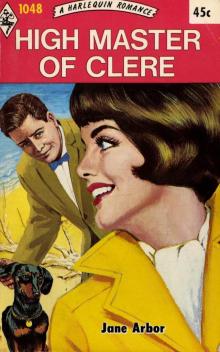 High Master of Clere
High Master of Clere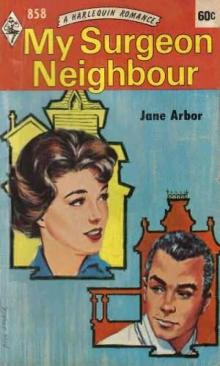 My Surgeon Neighbour
My Surgeon Neighbour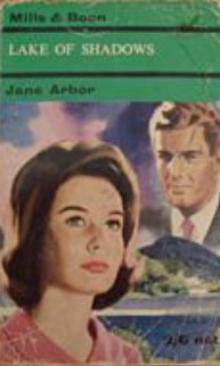 Lake of Shadows
Lake of Shadows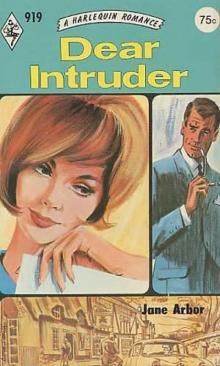 Dear Intruder
Dear Intruder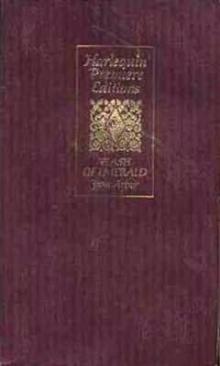 Flash of Emerald
Flash of Emerald Return to Silbersee
Return to Silbersee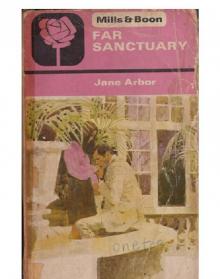 Far Sanctuary
Far Sanctuary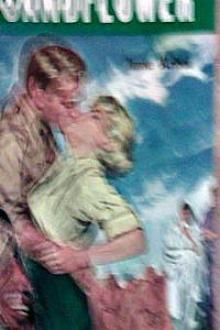 Sandflower
Sandflower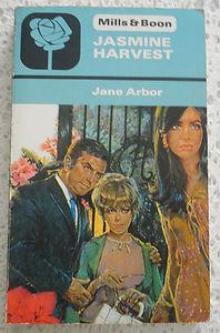 Jasmine Harvest
Jasmine Harvest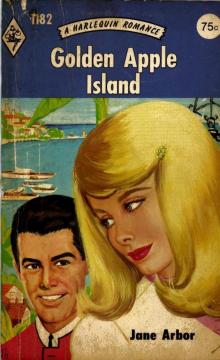 Golden Apple Island
Golden Apple Island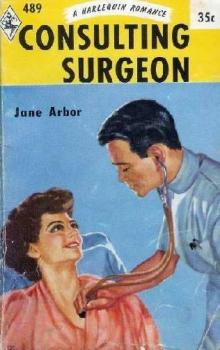 Consulting Surgeon
Consulting Surgeon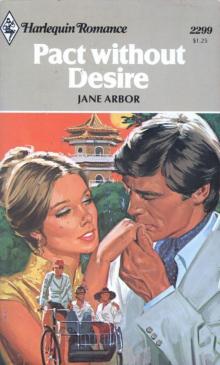 Pact without desire
Pact without desire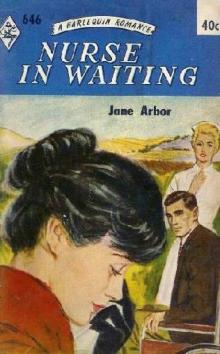 Nurse in Waiting
Nurse in Waiting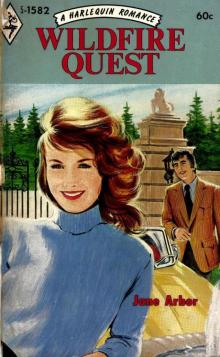 Wildfire Quest
Wildfire Quest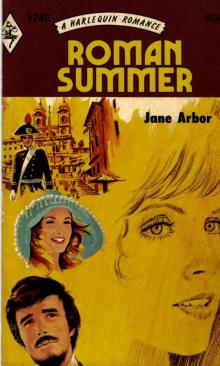 Roman Summer
Roman Summer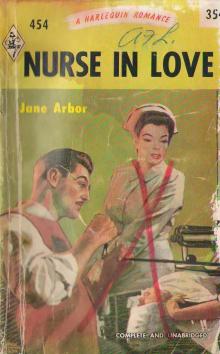 Nurse in Love
Nurse in Love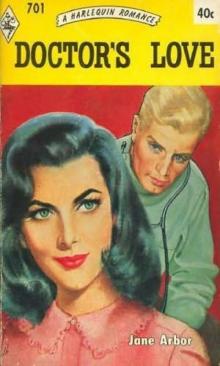 Doctor's Love
Doctor's Love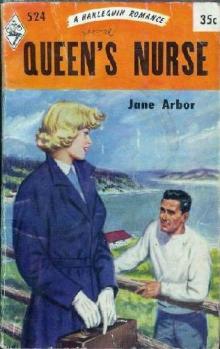 Queen's Nurse
Queen's Nurse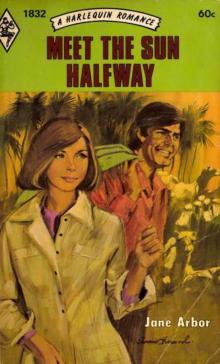 Meet the Sun Halfway
Meet the Sun Halfway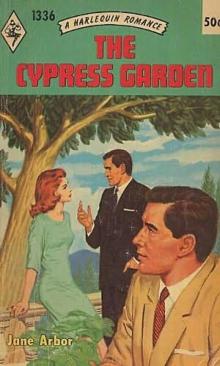 The Cypress Garden
The Cypress Garden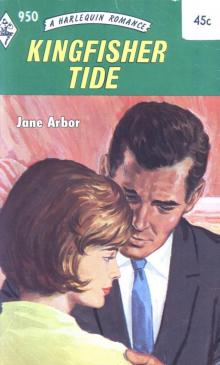 Kingfisher Tide
Kingfisher Tide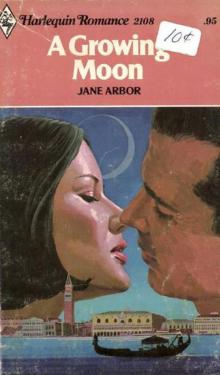 A Growing Moon
A Growing Moon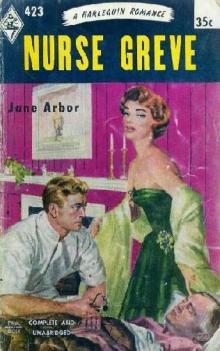 Nurse Greve
Nurse Greve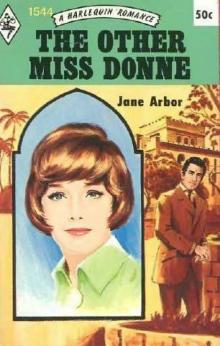 The Other Miss Donne
The Other Miss Donne